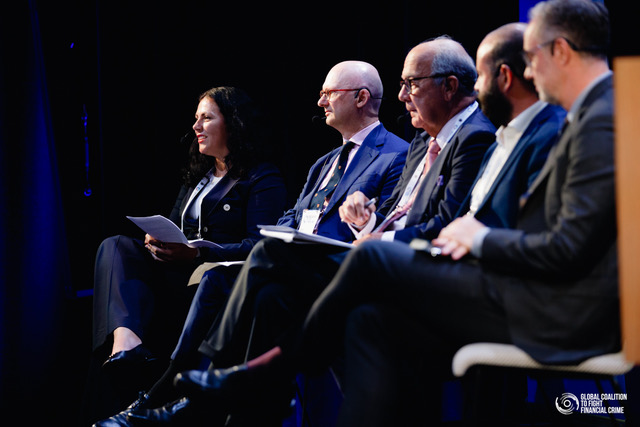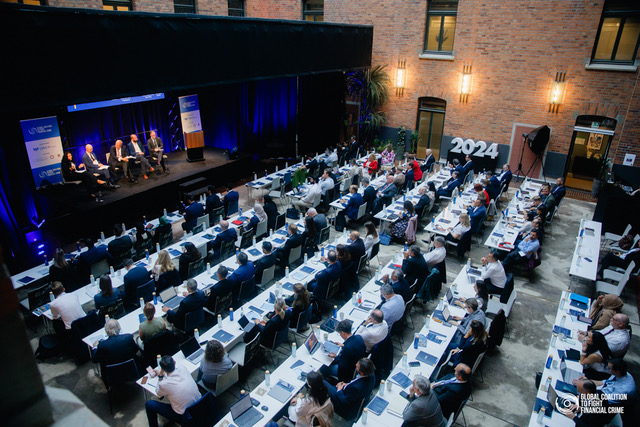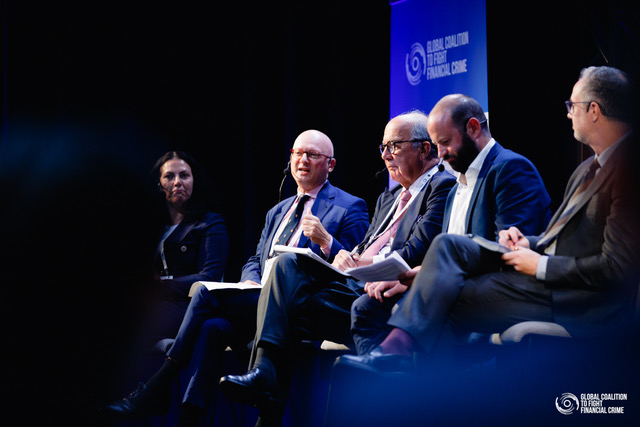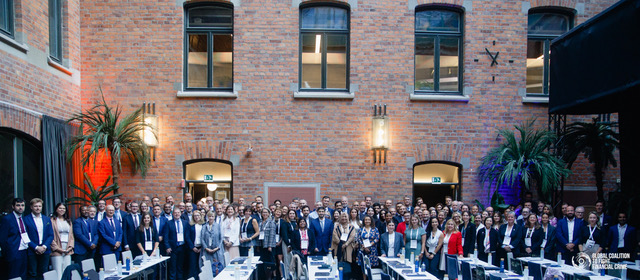Framing financial crime as a security threat
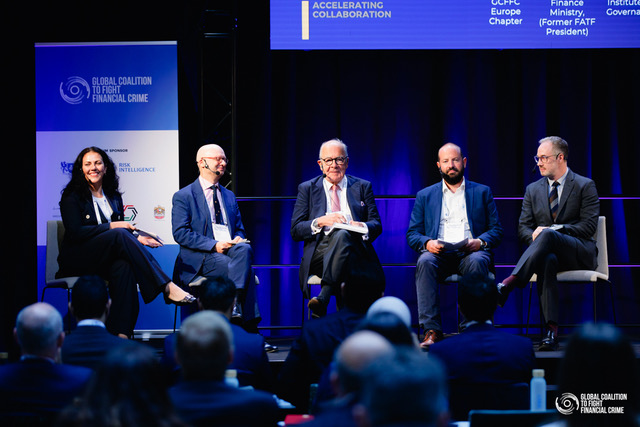
Is financial crime really a security threat, as an increasing number of countries and experts now say? If so, in what sense? And what implications might that have for our efforts to fight it?
The issues around framing financial crime as a threat to national and international security were a key topic on the agenda of the first international Summit of the Global Coalition to Fight Financial Crime (GCFFC) in Stockholm, Sweden, on 10–11 September 2024.
Under the theme Accelerating Cooperation, the event drew 140 financial crime fighters from a broad range of backgrounds, including law enforcement, financial intelligence units (FIUs), civil society, tech companies and banks.
Hans-Peter Bauer, Senior Advisor on AML/CFT and former Board Member of the Basel Institute on Governance, chaired a panel on Financial Crime as a Security Threat together with:
- David Lewis, Managing Director and Global Head of Anti-Money Laundering Advisory at Kroll and former Executive Secretary of the FATF;
- Marcus Pleyer, Deputy Director General of the German Finance Ministry and former Chair of the Financial Action Task Force (FATF);
- Ian Tennant, Director of the Global Initiative against Transnational Organized Crime; and
- Ilze Znotina, Chair of GCFFC Europe Chapter and former Head of the FIU of Latvia.
The panel discussed whether financial crime could and should be considered a serious threat to national and international security – and what the implications might be for political action against financial crime and the resources dedicated to it.
Financial crime causes immense harm
The discussion highlighted how financial crimes inflict terrible harm on individuals, societies and the global community. The damage goes well beyond the financial aspect.
Crimes like corruption and fraud are not victimless, even if the victims are sometimes hard to identify. Financially motivated crimes like the trafficking of drugs, humans and weapons cause immense harm to individuals and threaten the stability and security of whole societies. The same is true for environmental crimes like the illegal trade in wildlife and timber, which are now finally being recognised as a form of financial crime.
And as Markus Pleyer emphasised in a follow-up social media post, financial crime feeds terrorist activity and aggression, fuelling conflict. Even in relatively peaceful areas of the world, he said:
“Criminals can use their dirty money to exert economic or even political influence destabilising social order and subverting our state and economic structures.”
Despite the wide scope of meaning of the term “security”, the big picture is clear. It is vital to look not only at the monetary aspects of financial crime, but to consider the whole chain of actors involved in the crimes and the resulting impacts on peace, stability and social cohesion.
High profits for criminals, low rates of enforcement
The sheer scale of the impacts of financial crime is well illustrated in the GFCCC’s information wall, whose latest version shows estimates of criminal activity and resulting illicit funds across a wide spectrum of crime typologies.
Yet detection and conviction rates for financial crime offences remain stubbornly low across the world. Estimates of the amount of illicit financial flows intercepted and recovered hover around 1 percent, as the Basel AML Index’s latest public report shows.
This gap led the panel – and many in the audience – to agree that a profound reform of the current system and approach to fighting financial crime is required.
Political implications
One political implication of recognising financial crime as a security threat is organisational. For example, Germany included the fight against financial crime into its national security strategy in 2023. Among its measures will be the setup of a new Federal Financial Crime Authority with powers and competences that go beyond those of a typical FIU.
Other implications might be new structures to facilitate public-private information sharing on financial crime cases. Legal reforms may be needed to allow this, as well as to facilitate private-private exchange of such information.
The rollout of beneficial ownership registers might see a boost if government leaders understand the critical need for accurate information on the owners of companies and assets to be available to the competent authorities and others with a legitimate interest.
Another positive outcome of recognising financial crime as a security threat would be a much-needed increase in resources for law enforcement and the judiciary, including to follow up on cases where financial institutions report suspicious activity.
Fighting financial crime is not an end in itself
The conference topics showed a clear recognition that tackling financial crime is critical to tackling some of the world’s greatest challenges.
In addition to the panel on financial crime as a security threat, the participants explored modern slavery and human trafficking, trade-based financial crime, dealing with mercenaries and private military, information sharing through public-private partnerships, balancing data privacy concerns, and how to improve the effectiveness of anti-money laundering supervision.
The energy and dynamism in the room also demonstrated the value of bringing together leading voices from across the world to discuss critical emerging issues and find consensus where possible.
We are proud to have been a member of the Global Coalition since its establishment and to have taken part in this first global conference. Congratulations to the organisers, particularly John Cusack and Che Sidanius. There was much interest in making this an annual event – so we look forward to being present again at Stockholm 2025!

